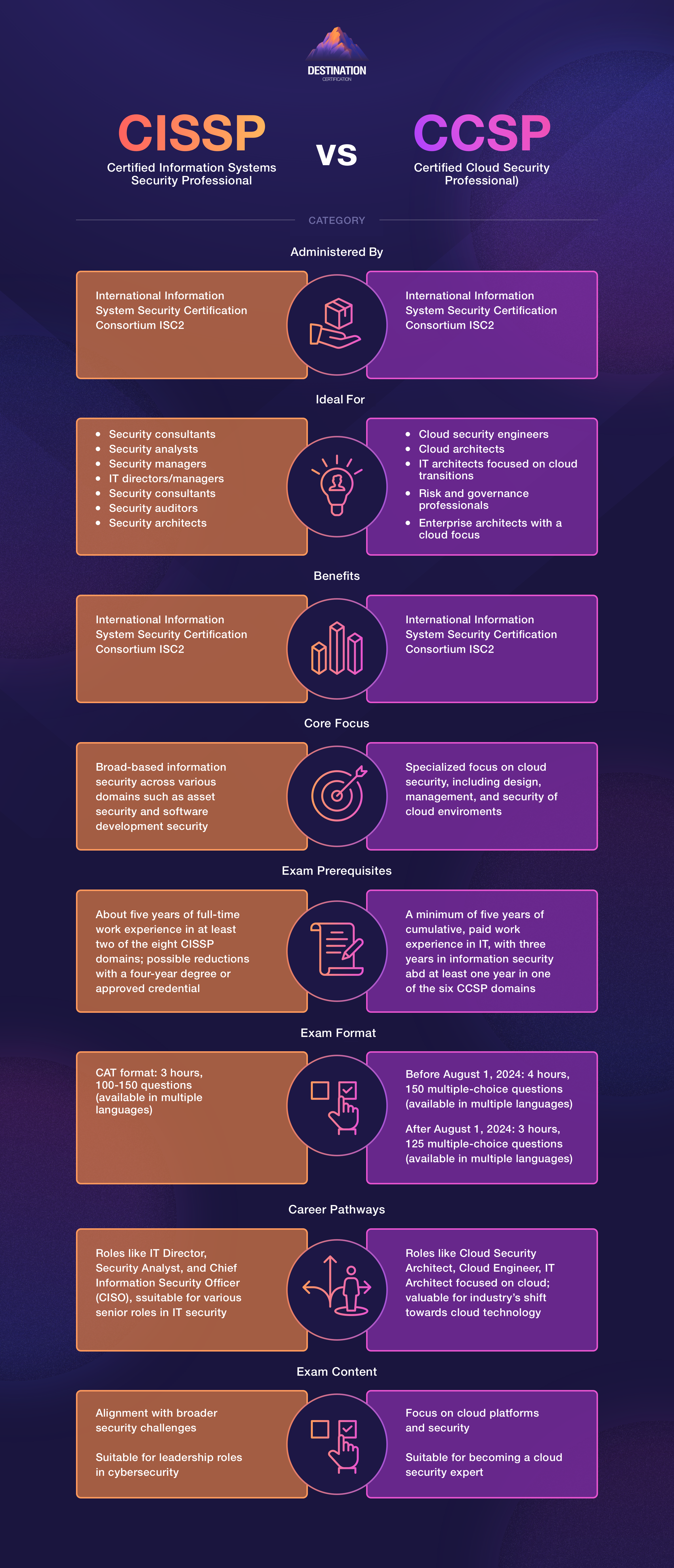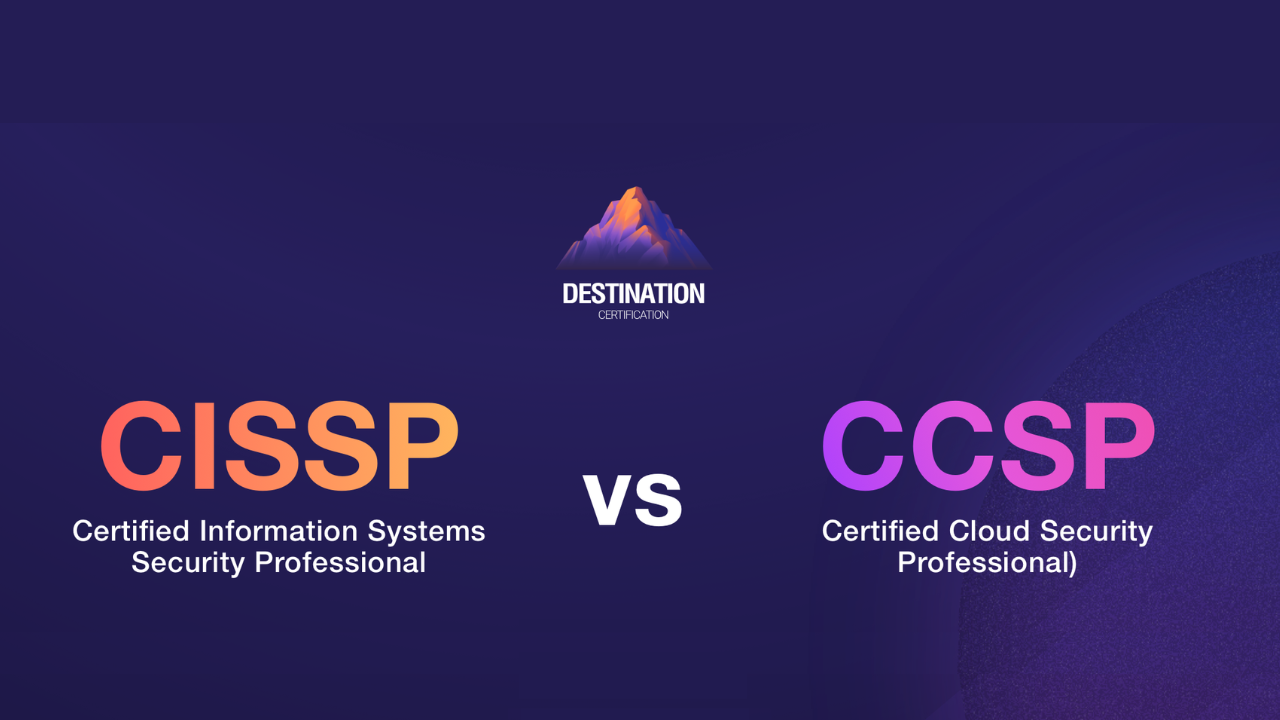Deciding between CISSP and CCSP is like standing at a crossroads in your professional journey. Each path offers its unique challenges and rewards. One might cater more to a broad-based security understanding, while the other dives deep into the ever-evolving world of cloud security
If you're reading this, chances are you've already recognized the value of these certifications. But understanding their nuances and making an informed choice? That's the trickier part.
In this article, we'll break down the essentials of CCSP vs CISSP. We're not just skimming the surface; we'll delve deep, laying out the specifics of each certification, what they bring to the table, and how they can shape your future in the cybersecurity domain. By the end, our goal is to equip you with the clarity needed to take that confident step forward.
Ready to dive in? Let's roll.
Understanding CISSP
The Certified Information Systems Security Professional (CISSP) is a globally recognized certification, administered by the International Information System Security Certification Consortium, or ISC2. Considered a gold standard in the cybersecurity world, CISSP is a testament to one's deep knowledge and experience in designing, implementing, and managing a best-in-class cybersecurity program.
Who should consider CISSP?
The CISSP is best suited for IT professionals serious about careers in information security. It's ideal for:
- Security consultants
- Security analysts
- Security managers
- IT directors and managers
- Security auditors
- Security architects
If you've been in the IT field, especially with a security focus, and are aiming for leadership or senior roles, CISSP is your ticket.
Benefits of CISSP
- Career Opportunities: With a CISSP badge on your resume, doors to higher-level positions like CISO, security auditor, and IT director swing open more easily. According to a CyberSeek report, CISSP is one of the top three certifications requested in cybersecurity job postings.
- Potential Salary Increase: A CISSP certification can translate into a higher salary. A Global Knowledge report found that CISSP-certified professionals earn, on average, about 25% more than their non-certified counterparts.
- Industry Recognition: One of the CISSP certification advantages is that it’s recognized globally and is often a requirement by companies for their information security personnel. The ISC2 regularly updates its CISSP content, ensuring it remains relevant and reflective of the latest in the cybersecurity domain.

CCSP overview
In an age where businesses are rapidly shifting to the cloud, securing this vast digital realm becomes paramount. Managed by the trusted ISC2, the Certified Cloud Security Professional (CCSP) certification equips professionals with the expertise to design, manage, and secure cloud environments. Simply put, it's your mark of excellence in the cloud security world.
Who's the ideal CCSP candidate?
If you're already navigating the realms of IT and have an inclination toward cloud technologies, this could be up your alley. The CCSP is especially fitting for:
- Cloud security engineers
- Cloud architects
- IT architects focused on cloud transitions
- Risk and governance professionals
- Enterprise architects with a cloud focus
Benefits of CCSP
- Industry Demand: As companies move to the cloud, the demand for specialists in cloud security is skyrocketing. A report from the Cloud Security Alliance underscores the growing need for skilled professionals in this domain.
- Specialization Perks: While CISSP covers a broad spectrum of security topics, CCSP sharpens your focus, positioning you as a specialized authority in cloud security. Think of it as honing a particular set of skills that are highly sought after in today's market.
CCSP vs CISSP: Key differences
Navigating the world of cybersecurity certifications can sometimes feel like comparing apples to oranges. But when it comes to CCSP and CISSP, understanding their distinct differences can be pivotal in guiding your career decisions. Let's demystify the two:
Core focus
- CISSP: This is your comprehensive, all-encompassing certification when it comes to information security. It delves into various domains, from asset security to software development security, giving you a rounded view of the entire security landscape.
- CCSP: As the name suggests, the Certified Cloud Security Professional certification hones in on cloud security. It equips you with the know-how to design, manage, and secure cloud environments, making you the go-to person for anything related to cloud safety.
Exam prerequisites
- CISSP: Generally, you'll need about five years of full-time work experience in at least two of the eight CISSP domains. But there are some ways around this, like having a four-year college degree or an approved credential, which can knock off a year from that requirement.
- CCSP: You should have a minimum of five years of cumulative, paid work experience in IT, of which three years must be in information security and at least one year in one of the six CCSP domains.
Exam format and content
- CISSP: The CISSP exam boasts two distinct formats: CAT (Computerized Adaptive Testing) and Linear. The CAT format is presented in English and runs for 4 hours, covering between 125 to 175 questions. These questions blend multiple choice with advanced innovative items. If you're taking the Linear format, be prepared for a 6-hour session. Here, you'll grapple with 250 questions, combining both multiple-choice and innovative items. For our international enthusiasts, the Linear format is available in languages like Chinese, German, Japanese, Korean, and Spanish.
- CCSP: The CCSP exam takes you on a 4-hour journey through 150 multiple-choice questions. While the primary language of instruction is English, for those preferring other tongues, the exam also comes in Chinese, German, Japanese, Korean, and Spanish. This diverse language offering ensures a wider audience can demonstrate their expertise in cloud security.
Career paths after each certification
- CISSP: With CISSP under your belt, you're looking at roles like IT Director, Security Analyst, and even Chief Information Security Officer (CISO). It’s a broad certification, so it can pave the way for various senior roles in IT security.
- CCSP: Post-CCSP, you're primed for roles like Cloud Security Architect, Cloud Engineer, or IT Architect with a focus on the cloud. Given the industry's cloudward shift, these roles are in high demand, making the certification a valuable asset.
Factors to consider when choosing between CISSP v.s CCSP
Choosing between CCSP and CISSP is like picking between chocolate and vanilla – both are delightful in their own right, but your choice boils down to personal taste and where you see yourself in the world of cybersecurity.
As you stand at this crossroads, there are a few factors that might help guide your footsteps. Let's explore these breadcrumbs that could lead you to your certification destination:
Current job role and responsibilities
Start where you stand and reflect on your daily tasks. If you're regularly working with cloud platforms, securing and managing them, CCSP might resonate more with your present duties. On the other hand, if you're enveloped in a broader scope of security challenges, CISSP may align better with your current role.
Future career aspirations
Envision where you'd like to be a few years down the line. If becoming a cloud security expert is on your horizon, then CCSP is a logical step forward. Alternatively, if your sights are set on a broad-based leadership role in the cybersecurity realm, CISSP could be your north star.
Your interest
What sparks your curiosity? If the evolving world of cloud technology captivates you, then CCSP might be your calling. However, if you're intrigued by the expansive and multifaceted domain of security, CISSP offers a comprehensive exploration.
Training resources and investment
Let's get pragmatic. Both certifications require an investment of time and finances. Assess the resources available to you. Dive into available training options, gauge the depth of study materials, and consider the financial aspect before committing to one.
Frequently Asked Questions
Yes, ISC2 certifications, like CISSP and CCSP, are highly regarded in the cybersecurity industry. They can enhance career prospects, increase earning potential, and validate one's expertise in specific security domains.
The CCSP exam fee is $599. However, prices can change, so it's advisable to check the official ISC2 website or contact them directly for the most current pricing.
To obtain the CCSP certification, you must have a minimum of five years of cumulative, paid work experience in information technology, of which three years must be in information security and one year in one of the six domains of the CCSP. Then, pass the CCSP exam and adhere to ISC2's Code of Ethics.
Importantly, if you already hold the CISSP certification, the experience requirements for the CCSP are automatically waived.
The difficulty is subjective and depends on one's background. CISSP covers a broader range of information security topics, while CCSP focuses specifically on cloud security. For professionals with experience in cloud computing, CCSP might be less challenging; for others, CISSP may be more familiar.
CISSP is designed for experienced information security professionals aiming for senior or managerial positions, such as CISOs, security managers, directors, or consultants.
The CISSP certification is valid for three years. To maintain the certification, holders must earn Continuing Professional Education (CPE) credits and pay an annual maintenance fee. If these requirements are not met, the certification will expire.
CCSP and CISSP target different aspects of information security. CCSP is focused specifically on cloud security, making it better for professionals working primarily with cloud technologies. CISSP offers a broader overview of information security, making it valuable for a wide range of roles in the field. The better certification depends on your specific career focus and interests.
CCSP vs. CISSP: Which should you take first?
As we wrap up this discussion, it's essential to acknowledge that there isn't a one-size-fits-all answer. Instead, the journey of choosing which certification to take-- CISSP or CCSP--is highly personalized, much like selecting the perfect playlist for a long drive.
Maybe you're wondering, "Is CISSP still valuable in today's rapidly changing tech landscape?" The answer is a resounding yes, especially if your ambitions lie in a broad spectrum of security topics. However, if cloud security beckons you, the CCSP certification might be the tuning fork that resonates with your professional aspirations.
Whatever you choose, remember: Success hinges on preparation. Neither of these certifications is a walk in the park, but with the right training, the path becomes clearer and more manageable. That's where Destination Certification steps in.
We provide a CCSP Masterclass and CISSP training Masterclass tailored for individuals like you. These self-paced online courses adapt to your existing knowledge, ensuring you're neither overwhelmed nor under-challenged. And to bolster your studies, tools like our CISSP mindmaps and CCSP flashcard app are at your fingertips.
So, when you're gearing up to take that significant leap into the world of cybersecurity certifications, remember, we're here to jump with you.
Rob Witcher
Rob is the driving force behind the success of the Destination Certification CISSP program, leveraging over 15 years of security, privacy, and cloud assurance expertise. As a seasoned leader, he has guided numerous companies through high-profile security breaches and managed the development of multi-year security strategies. With a passion for education, Rob has delivered hundreds of globally acclaimed CCSP, CISSP, and ISACA classes, combining entertaining delivery with profound insights for exam success. You can reach out to Rob on LinkedIn.




